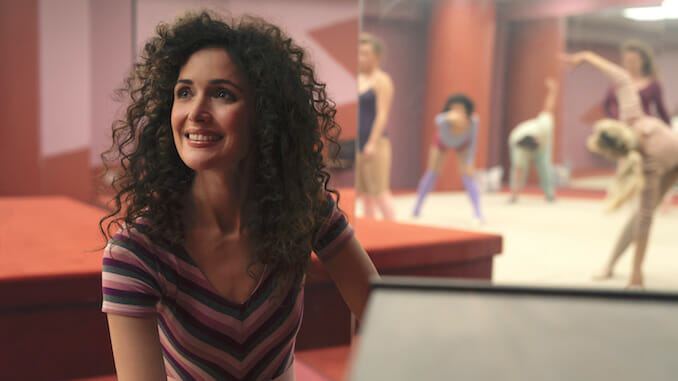Let’s Get Physical: Apple TV+’s New Dark Comedy Is Full of Potential
Photo Courtesy of Apple TV+
[This review originally published June 7th, 2021]
More than a year and a half after its launch, Apple TV+ remains somewhat of an enigma. The streaming service, without any licensed content, has one bona fide hit under its belt—the feel-good sports comedy Ted Lasso—and a couple of good, often great shows that have yet to break through to the masses (For All Mankind, Dickinson). Next, it will add to its small but growing catalog the ‘80s-set dark comedy Physical, which has the potential to reach similar creative heights, but may also be hamstrung by its existence on a streaming service that remains second tier to larger platforms like Netflix and HBO Max.
Created and executive produced by Annie Weisman, Physical is set in the early 1980s against a sun-drenched San Diego backdrop. It stars Rose Byrne as Sheila Rubin, an unhappy housewife quietly struggling with her self-image and her inability to assert herself in nearly every aspect of her life. This includes her marriage to Danny (Rory Scovel), whose liberal ideals seem to stop at the front door. For all his talk of being a progressive (which includes a campaign for state assembly that is essentially run by Sheila), he still expects her to play the role of dutiful wife and mother, which she does because she lacks agency—even though it’s glaringly obvious from the jump that she is the smarter and more talented of the two. The show even briefly references her unfinished graduate work in women’s studies, a pointed remark that drives home the two sides of Sheila—the woman she wants to be and could be if given the opportunity, and the woman she has become as a result of more traditional gender roles.
Sheila single-handedly runs the Rubin household while raising a 4-year-old daughter (who mostly exists to scream a lot) and also managing Danny’s campaign. It’s meant to be frustrating to watch, and it succeeds. But Sheila’s story becomes even more complicated once you learn of her deep self-hatred and how that has shaped her self-image for decades. She’s been living with bulimia since she was young and is seen binge-eating and purging throughout the 10-episode first season whenever she feels out of control. Her illness has destroyed her sense of self-worth, an idea that is effectively communicated in the show via voiceover. The character’s inner monologue seems specifically designed to showcase not just the dark and painful thoughts she experiences and turns inward every day, but what it must also be like to live in her shoes. It’s a reminder that no matter how polished or beautiful someone’s life looks from the outside, it’s impossible to know what they’re going through behind closed doors.
Everything begins to change, though, once Sheila finds a renewed sense of purpose in aerobics, the latest exercise fad sweeping the country. After teaming up with Bunny (Della Saba), a young instructor with her own studio, and Bunny’s boyfriend Tyler (Lou Taylor Pucci), a laid back surfer with an interest in filmmaking, Sheila creates the first at-home workout video which puts her on the long-awaited path toward empowerment and financial independence. Through fleeting glimpses of the future sprinkled throughout the season, we learn Sheila eventually becomes incredibly successful, which frames these 10 episodes as the origin story of the female lifestyle guru.